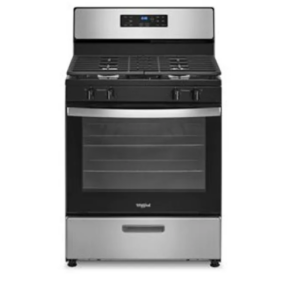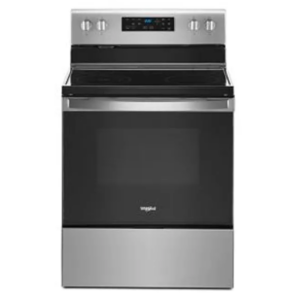
Electric Stove vs. Gas Stove: Which Is Best?
 Which appliance is better, a gas stove or an electric stove? The answer ranges from pragmatic — depending on whether your house or apartment has gas lines — to personal preference. Don your chef’s hat and dig into the sizzling showdown between electric and gas stoves in this guide.
Which appliance is better, a gas stove or an electric stove? The answer ranges from pragmatic — depending on whether your house or apartment has gas lines — to personal preference. Don your chef’s hat and dig into the sizzling showdown between electric and gas stoves in this guide.
The Basics: Gas Stove vs. Electric Stove
How Does a Gas Stove Work?
Gas stoves are the classic, tried-and-true method for cooking. They rely on natural gas or propane to generate heat on your stovetop and oven, creating an open flame beneath your pots and pans and within the oven cavity. The flame inside the oven cycles to regulate temperature, while those on the stovetop can be adjusted to your desired heat level and corresponding flame size.
How Does an Electric Stove Work?
Electric stoves (or ranges) might not have flames, but they sure know how to bring the heat. They often feature a flat ceramic or coil surface with hidden heating elements underneath. These metal heating elements become hot when electricity flows through them, spreading heat evenly across the stovetop. In the oven, heating elements on the top and bottom of the cavity maintain a constant temperature for baking, roasting, and broiling.
What’s the Difference Between a Gas Stove and an Electric Stove?
Cost
Electric stoves tend to be more budget-friendly upfront. They come in various models, some of which are relatively inexpensive. However, this price advantage can shift over time depending on electricity prices in your area.
Gas stoves usually demand more from your wallet in the beginning. This increased cost upfront is thanks in part to additional components like gas burners, pilot lights, and ignition systems. Additionally, gas ranges require a dedicated gas line. If your home is not already equipped with one, installation requires professional assistance, which could put a dent in your wallet.
When weighing the difference between gas stove vs electric stove costs, the more economical appliance is determined by the utility costs in your area and how your home is wired. Most homes are prewired for electric ranges, and since adding a gas line can be a bit pricier, electric is the way to go. Conversely, if your home already uses natural gas, then a gas range may be the more cost-efficient choice.
Cooking Control
Electric stoves provide even heating, which is excellent for precise cooking. They are ideal for simmering sauces, melting chocolate, and cooking delicate dishes. However, they are slower to heat up and cool down, which can be a drawback for those who prefer quicker results.
Gas stoves are often favored by professional chefs and home cooks who enjoy rapid temperature changes and powerful cooking capabilities. Perfect for high-heat tasks like searing and boiling, gas ranges provide instant heat, springing into action as soon as you turn the burner on.
In short, an electric stove is best suited for those who value gentle, even heating and fine-tuned control over their cooking process. But, if you’re a chef or cooking aficionado who enjoys greater flexibility in cooking techniques, gas is likely the better option.
Cleaning
Electric stoves often win in the cleaning and maintenance department. Their smooth, glass-ceramic surfaces are easy to wipe clean, and you won’t have to worry about food particles falling into unreachable burner grates. But beware, the smooth cooktop can be delicate, so avoid dropping heavy objects onto it or using abrasive cleaning materials.
Gas stoves, on the other hand, require a bit more upkeep. While removable burner grates and drip pans are easy to clean, the burners themselves can have nooks and crannies that accumulate dirt and grease, requiring more regular maintenance. Since spills are unavoidable when cooking, consider the time spent on cleaning when making your decision.
Safety
Safety in the kitchen is a non-negotiable. Electric stoves excel in this department. With no open flames to worry about, there’s a reduced risk of accidental fires and gas leaks. However, the glass or ceramic surfaces can be deceptively hot, leading to unintentional burns. So, while electric stoves are generally safer regarding open flames, caution remains the secret ingredient for safety.
Gas stoves, on the other hand, play with fire – quite literally. They’re renowned for their open flames, offering immediate visual feedback and allowing for quicker temperature adjustments. However, open flames do pose a higher risk of burns and gas leaks. To ensure safety, vigilance and regular maintenance of your appliance and gas lines are key. There are also other factors you may want to consider when determining how safe is a gas stove:
- Air Quality: Gas stoves can release indoor pollutants like carbon monoxide, nitrogen dioxide, and other matter you don’t want floating around. Make sure your kitchen is well-ventilated to avoid any potential hazards associated with these emissions.
- Gas Leaks: Gas stoves come with the risk of gas leaks. Invest in a good quality gas detector, and remember to check for leaks regularly.
Energy Efficiency
Are electric stoves more efficient than gas options? Oftentimes, yes — particularly if you’re looking into induction stove options. This means that electric stoves convert a larger percentage of the energy they consume into usable heat for cooking — thanks to their precise temperature control and even heating — making them more environmentally friendly and energy efficient.
Gas ranges tend to waste more energy during the cooking process. They lose heat due to open flames and convection, while electric stoves transfer heat directly to cookware. Gas stoves may also use more energy than electric options due to the energy used during ignition and pilot lights.
Longevity
When investing in a kitchen appliance, it’s important to consider how long it will serve you. Ultimately, the lifespan of both electric and gas stoves depends on how well they are maintained, cleaned, and used.
How long do electric stoves last?
Electric stoves have true staying power. Known for their durability, this option can last for years without much trouble. On average, electric ranges can last anywhere from 13 to 15 years with proper care and maintenance.
Factors that contribute to the extended life of electric stoves include regular cleaning, avoiding excessive wear and tear, and addressing any issues promptly. The absence of open flames means fewer components are prone to wear, which can help extend their lifespan.
How long do gas stoves last?
Gas stoves are no slouch, either. They can also stick around for the long haul, provided you take good care of them. While equally sturdy, gas stoves do tend to have a slightly longer lifespan. With proper care, maintenance, and the occasional repair, a gas stove can often last 15 to 17 years.
Factors contributing to the longevity of gas stoves include keeping burners and gas lines clean, addressing any gas leaks or ignition issues when needed, and ensuring safe usage practices.
Gas vs. Electric Range: Pros and Cons
So, how do you choose between these electric vs. gas ranges? When weighing the pros and cons of a gas stove vs. an electric stove, consider these factors:
Gas vs. Electric Stove Pros and Cons |
||
Feature |
Electric Stoves |
Gas Stoves |
|---|---|---|
| Upfront Costs | Often cheaper than gas stoves | Often more expensive than electric stoves |
| Operating Costs | Varies depending on electricity prices | Varies depending on natural gas prices |
| Cooking Control | Precise and accurate heating controls | Less precise, but perfect for high-heat tasks |
| Cleaning | Easier to clean | May require more effort to clean |
| Safety | Potential for unintended burns due to less visual heating cues | Potential for indoor air pollutants, gas leaks, and burns |
| Energy Efficiency | Often more energy efficient due to even energy use | Less energy efficient than due to uneven energy use |
| Longevity | 13 to 15 years, but varies due to maintenance and use | 5 to 17 years, but varies due to maintenance and use |
What Will You Choose: Gas or Electric? Rent-A-Center Can Help!
So, are gas or electric stoves better? In the great sizzle showdown, there’s no one-size-fits-all answer. The best option depends on your culinary style, kitchen needs, and safety concerns.
Electric stoves are the meticulous bakers and gentle simmers, while gas stoves are the flamboyant sear kings and rapid-fire pros. So, when choosing, remember – it’s not about the best stove; it’s about the best stove for you.
Once you’ve made your decision, it’s time to find an appliance that fits your space and your budget. Rent-A-Center has a wide selection of both gas and electric ranges for whichever option you choose. Select from reputable brands like Whirlpool, Amana, and Maytag and enjoy flexible payment options, free delivery and set-up, and more! Shop online or stop by your local Rent-A-Center today!